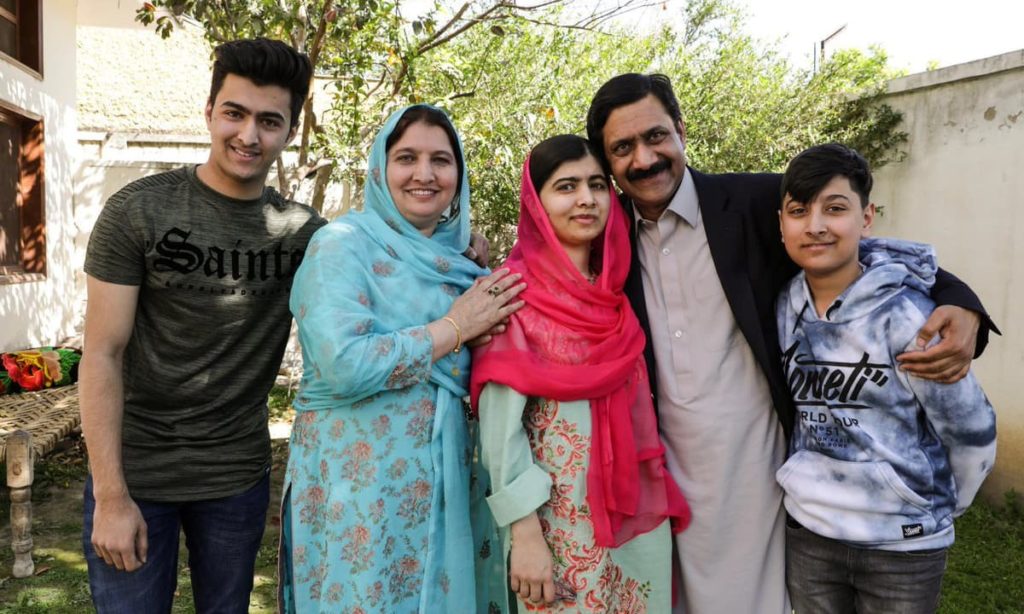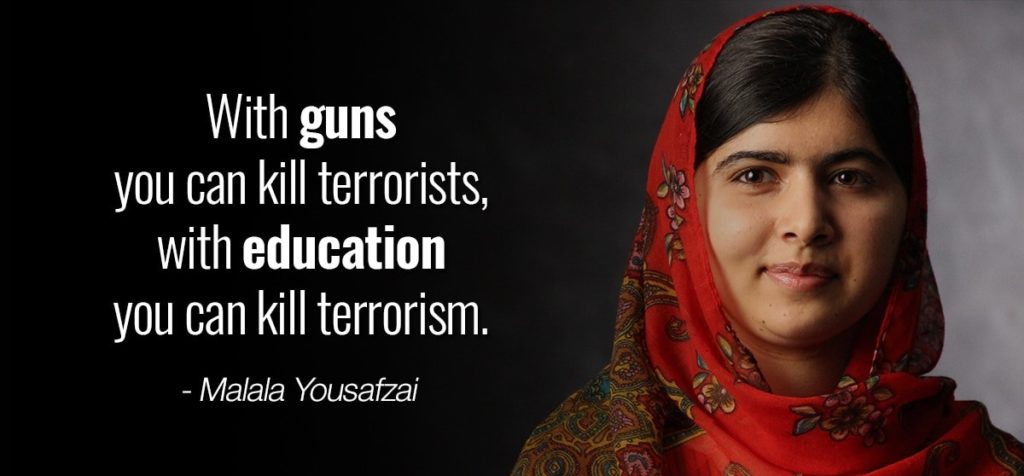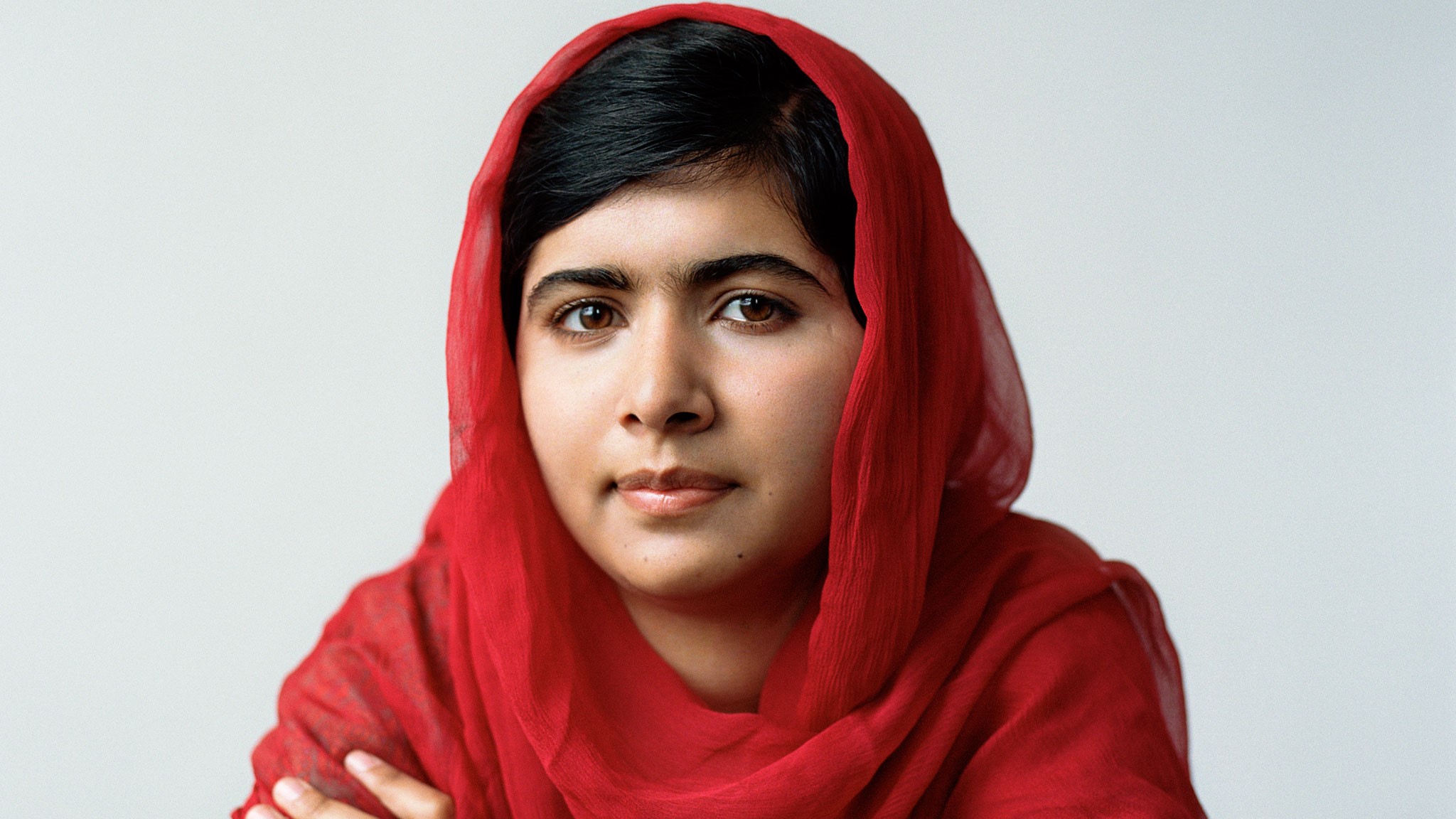Malala Yousafzai: A Young Leader is born
One child, one teacher, one book and one pen can change the world.
Malala Yousafzai
Malala Yousafzai, the youngest Nobel Peace Prize Laureate, is a Pakistani activist who works to facilitate education to approximately forty thousand girls globally. She is now on her way to raise this target to one hundred thirty million girls who remain deprived of the fundamental right to education. This young advocate was born on 12th July 1997 in Mingora city in Swat valley, Pakistan (now known as Khyber Pakhtunkhwa Province of Pakistan). She is the daughter of Ziauddin Yousafzai, an education and social activist, and Toor Pekai Yousafzai, and has two younger brothers: Atal Yousafzai and Khushal Yousafzai. Her journey began while attending a school named Khushal Girls High School in Swat, founded by her father until the Taliban seized control of Swat valley – and a series of unfortunate events that transformed her life would follow.

The Taliban’s Repressive Control
Swat valley, as Malala described, was a paradise on Earth. The lush greenery, tall trees, and the high hills surrounding the district added to its picturesque scenery. It was a great tourist attraction site. But when the Taliban took control in 2007, Swat became a living hell for its people. The Taliban began to impose repressive policies in the name of Islam – especially for women and girls. For instance, schools were banned as part of the strict Islamic laws imposed, prohibiting girls from attaining an education. Women were forbidden from going to the markets, and more restrictions followed, as freedoms began to erode. Beyond these policies, the Taliban bombed around four hundred schools – a clear indication of their willingness to use violence if necessary to achieve their goals. Many called for the adjournment of these rules, but whosoever raised the voice was silenced using arms. People were therefore compelled to live as refugees in their own country.

How did she encourage the women of Pakistan?
Amongst these refugees, Malala – bold and determined to pursue her education and exercise her fundamental rights – stood up against the oppressive regime. In September 2008, she gave her first speech titled “How dare the Taliban take away my basic right to education” in a press club in Peshawar – which was then broadcasted all over Pakistan. By the end of the year, she began writing blogs under the identity Gul Makai, in collaboration with the British Broadcasting Corporation (BBC), expressing her views over her daily life under the Taliban rule.
At the beginning of the year 2009, she appeared on a television show named “Capital Talk”, where a Pakistani journalist interviewed her regarding the current situation in Swat. That same year, she worked with New York Times reporter Adam Ellick to create two documentary films “Class Dismissed” and “A Schoolgirl’s Odyssey” – both reflecting the shutdown of schools in Pakistan after the Taliban took over. Because of her continuous appearances in television and media, her identity as the BBC’s young blogger was revealed and she received widespread recognition for her work. In early 2011, she was nominated for the International Children’s Peace Prize and was also awarded the National Youth Peace Prize.

A Bullet that changed her life..
Her activism gathered people’s support and her voice grew louder – demanding equal rights for women. But as her message echoed further, her life became endangered. This would culminate in 15-year-old Malala being shot in her head by a gunman when she was on her way home on a bus along with her friends. She was immediately taken to a military hospital in Peshawar – however, observing her critical condition and the unstoppable bleeding and swelling in her brain, doctors advised her family to airlift her to a more advanced hospital in Birmingham, England, for surgery. After weeks of treatment and psychological support, she survived this brutal assassination attempt and was taken out of an induced coma.

In the aftermath of the attack, Malala relocated to the UK and continued to pursue her education at the Edgbaston High School in England. Years later, she would also graduate from the prestigious University of Oxford with a bachelor of arts in Philosophy, Politics, and Economics.
The Youngest Women to win the Nobel Peace Prize!
Her activism persisted even in the face of adversity. She made her first appearance at the United Nations in New York City on her 16th birthday, addressing an audience of over five hundred people, and stated: “the terrorists thought that they would change our aims and stop our ambitions, but nothing changed in my life except this: weakness, fear, and hopelessness died. Strength, power, and courage were born”. In the aftermath of her speech, the former Secretary-General of United Nations announced that the 12th July – Malala’s birthday – would be known from then on as Malala Day, in honor of Malala Yousafzai’s work inspiring girls to pursue their education.
“Dear sisters and brothers, I am not against anyone. Neither am I here to speak in terms of personal revenge […] I am here to speak up for the right of education for every child. I want education for the sons and daughters of […] all terrorists and extremists.”
Malala Yousafzai, From her speech at the United Nations
In 2013, with the help of her father, she established the Malala Fund – aimed at providing free and quality primary and secondary education to all girls globally. It specifically focused on countries where there was most work to be done – namely Afghanistan, Nigeria, Iraq, India, Pakistan, Turkey, Ethiopia, and Brazil. That year saw her first nomination for the Nobel. However, it would be in 2014 when she would finally receive the prestigious Nobel Peace Prize in recognition for her continued efforts, individually and within the Malala Fund, towards the advancement of girls’ rights to access education – officially becoming the youngest woman ever to receive this recognition.

Her core work and values
Malala’s work has accelerated at a rapid pace ever since and continues to have an international impact. In 2015, she opened a school in Lebanon providing elementary and secondary level education to Syrian refugee girls. Besides providing education, this project also aimed to help these girls combat regressive cultural norms for women, stereotypical traditions, child labor, and early marriage, among others. In Nigeria, she supported the campaigns and efforts to rescue the abducted girls kidnapped by Boko Haram. Malala has affirmed the core need to promote equal access to education – in her words, “women are about half the world, and if the world is not educating them, the world is losing. Educating women can improve the performance of the global economy by adding at least thirty trillion dollars to it.”
Her autobiography, “I Am Malala: The Girl Who Stood Up for Education and Was Shot by the Taliban”, as well as her other books, “Malala’s Magic Pencil” and “We Are Displaced”, share both hers and other girls’ stories across refugee camps in Nigeria, Colombia, Syria, and Afghanistan – seeking to raise awareness about the difficulties that girls still face in attaining basic education today.
I tell my story, not because it is unique, but because it is the story of many girls.
Malala Yousafzai

A young source of inspiration
This active feminist and young advocate has proven to be a source of inspiration for youth worldwide – willing to risk her life for the welfare and future of other women and girls. Her powerful words, strong belief in the core necessity of education, determination to provide this right to all the girls around the world, and selfless contribution towards the development of women’s rights are remarkable and illustrious feats. To continue to support her work in attaining local and equitable access to education, see the efforts and progress of the Malala Fund.

IVolunteer International is a 501(c)3 tech-nonprofit registered in the United States with operations worldwide. Using a location-based mobile application, we mobilize volunteers to take action in their local communities. Our vision is creating 7-billion volunteers. We are an internationally recognized nonprofit organization and is also a Civil Society Associated with the United Nations Department of Global Communications. Visit our profiles on Guidestar, Greatnonprofits, and FastForward.


